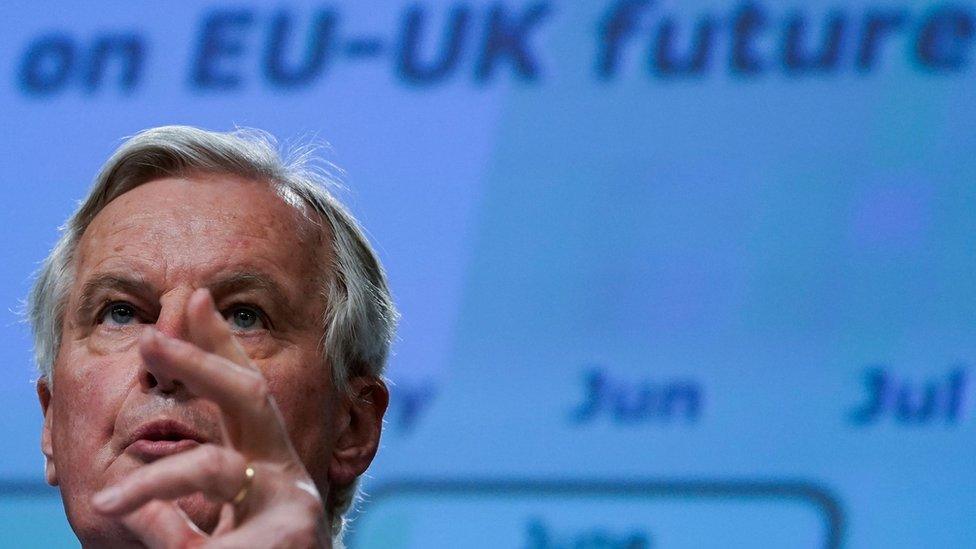Delay Brexit deadline amid coronavirus, say MEPs
- Published
- comments

The EU's chief negotiator Michel Barnier has contracted coronavirus
Prime Minister Boris Johnson has been urged by a group of MEPs to delay his Brexit deadline as countries around the world battle the coronavirus.
The European Parliament’s largest group of MEPs said the pandemic puts pressure on the chance of securing a trade deal by the planned date.
The PM’s spokesman insisted there were no plans to change the timetable.
It comes as EU and UK representatives met to discuss implementing the Brexit withdrawal agreement over video link.
Under the agreement, the UK enters a transition period where it will continue to follow EU rules until 31 December 2020, by which time both sides say they hope to have agreed a trade deal.
Downing Street said the talks to agree a deal are continuing to take place over the phone, amid the coronavirus outbreak.
The EU’s chief negotiator Michel Barnier has contracted the disease, and his opposite UK number David Frost has had to self-isolate.
The European People’s Party MEP Christophe Hansen, a negotiator on the parliament's international trade committee, said: "Under these extraordinary circumstances, I cannot see how the UK government would choose to expose itself to the double whammy of the coronavirus and the exit from the EU single market, which will inevitably add to the disruption, deal or no deal.
"I can only hope that common sense and substance will prevail over ideology.
"An extension of the transition period is the only responsible thing to do."
And the German MEP David McAlister said: "The coronavirus pandemic complicates the already very ambitious schedule.
"The EU has always been open to extending the transition period - the ball is now clearly in the British court.”
The European Parliament will get a say in ratifying any future trade deal.
When asked if an extension was possible, the prime minister’s spokesman said: "The transition period ends on December 31 2020. This is enshrined in UK law."
'Key priority'
The UK has also held a meeting with the European Commission to talk about implementing the withdrawal agreement.
Following the meeting between European Commission Vice-President Maros Sefcovic and UK senior minister Michael Gove, a commission statement said that “the proper and timely implementation of the withdrawal agreement is a key priority for the EU".
It added: “This concerns in particular safeguarding the rights of around 4.5 million EU citizens and UK nationals, and maintaining peace and stability on the island of Ireland in the context of the Good Friday Agreement, while ensuring the integrity of the single market.”
The statement also said both sides had “agreed on the importance for the UK to set out its plans over the coming months with regard to the implementation of the protocol on Ireland/Northern Ireland”.
It said there was "an urgent need to present a detailed timetable and proceed with the necessary measures, such as preparing for the introduction of customs procedures for goods entering Northern Ireland from Great Britain.”
Under the Brexit deal reached in 2019, Northern Ireland will continue to follow EU rules on agricultural and manufactured goods. The rest of the UK will stop following these rules at the end of 2020.